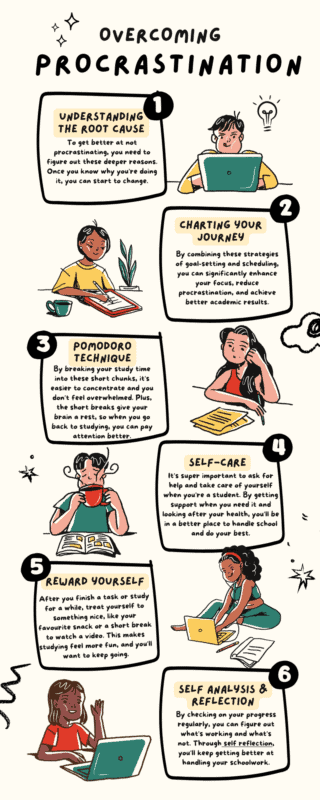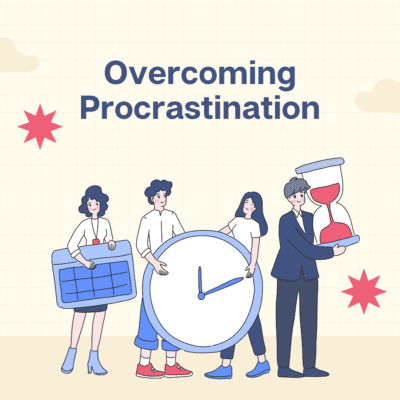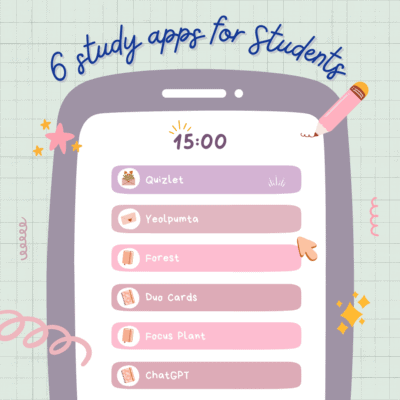As a student, learning how to study effectively is key to achieving academic success. It’s not just about how much time you spend with your books; it’s also about how you use that time and the methods you use. Let’s explore some of these strategies in detail, so you can find the best ways to improve your study habits and reach your academic goals!
Understanding the Root Cause of Procrastination
Understanding why you procrastinate is really important if you want to stop doing it. Sometimes, when we put things off, it’s not just because we don’t feel like doing them. It can be because we’re scared of not doing them perfectly, or we’re worried about failing. Like, maybe you keep putting off a big project because you’re worried you can’t make it perfect. This can make you feel really stressed. To get better at not procrastinating, you need to figure out these deeper reasons. Once you know why you’re doing it, you can start to change. This could mean setting goals that you can actually reach, learning that it’s okay to not be perfect, or talking to someone like a teacher or a counsellor if you’re feeling really stuck. When you deal with the real reasons you procrastinate, it becomes a lot easier to manage your time and get things done.
Charting your Studying Journey
Setting clear goals and creating a consistent schedule are key steps in improving study habits and overcoming procrastination. As a student, begin by breaking down your study material into smaller, more manageable tasks. This approach makes large projects or subjects seem less overwhelming and more achievable. For example, instead of simply aiming to “study history,” set a specific goal like “read and summarise one chapter of the history textbook.” Once your goals are clear, develop a schedule that allocates specific time

Pomodoro Technique
The Pomodoro Technique is a really cool way to help you stop procrastinating and get more done.
Here’s how it works: you study for 25 minutes without any breaks or distractions. After that, you take a 5-minute break to do something relaxing, like stretching or having a snack. Then, you go back to studying for another 25 minutes.
This pattern helps you stay focused and not get too tired. By breaking your study time into these short chunks, it’s easier to concentrate and you don’t feel overwhelmed. Plus, the short breaks give your brain a rest, so when you go back to studying, you can pay attention better. Using the Pomodoro Technique can make your study time way more effective, especially if you have a lot of stuff to learn!
Self-care
It’s super important to ask for help and take care of yourself when you’re a student. If you’re struggling with your schoolwork, don’t be afraid to reach out to your friends, teachers, or even a school counsellor. They can give you advice, help you understand things better, or just listen when you need to talk. Also, remember to take care of your health. Make sure you’re getting enough sleep, eating healthy foods, and doing some exercise. When you sleep well, eat right, and move around, your brain works better, and you can focus more in class and when you study. By getting support when you need it and looking after your health, you’ll be in a better place to handle school and do your best.
Reward yourself!
Giving yourself little rewards and staying calm are great ways to help you study better. After you finish a task or study for a while, treat yourself to something nice, like your favourite snack or a short break to watch a video. This makes studying feel more fun, and you’ll want to keep going. Also, try to stay calm and not get too stressed. Simple things like taking deep breaths or doing a bit of meditation can really help. They make you feel more relaxed and clear-headed. When you combine rewards for hard work and techniques to chill out, you’ll find that studying gets a lot easier and less overwhelming. Don’t be afraid to reward yourself proportionately!
Self Analysis and Reflection
Taking some time to think about how you’re doing with your schoolwork can really help you get better at studying. Every once in a while, like at the end of the week, look back at what you’ve learned and what you’ve finished. Ask yourself questions like, “What did I do well?” and “What can I do better next time?” Maybe you’ll realise that studying in the morning works best for you, or that you need to spend more time on maths. By checking on your progress regularly, you can figure out what’s working and what’s not. Then, you can make small changes to study smarter, not harder. Through self reflection, you’ll keep getting better at handling your schoolwork.

Conclusion:
Remember, the key to overcoming challenges like procrastination and stress is not just in what you do, but also in how you approach your studies. Each of these strategies offers a step towards more efficient and enjoyable learning. With patience, practice, and a bit of planning, you can transform your study habits and achieve greater academic success.





